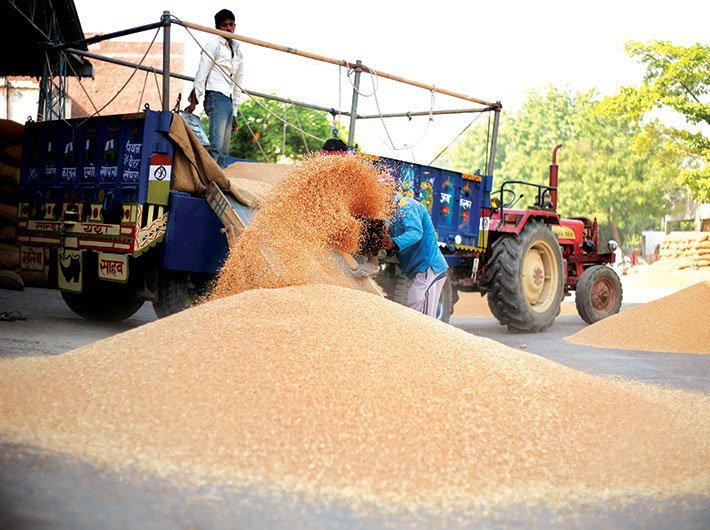After oil and food, fertilisers account for the third-biggest share of India’s total subsidy bill
The government has decided to launch the Direct Benefit Transfers (DBT) for fertiliser subsidies on January 1, 2018.
After oil and food, fertilisers account for the third-biggest share of India’s total subsidy bill of Rs 2,32,704.68 crore for 2016-17 financial year. Fertilizer subsidy for 2017-18 is Rs70,000 crore.
The nutrient-based subsidy (NBS) scheme, introduced by the government in 2010, was meant to contain fiscal subsidy which had increased dramatically after 2006-07. Total fertilizer subsidy, which was Rs.26,222 crore in 2006-07, had increased by around three times to Rs.76,603 crore in 2008-09, leading the government to rethink the subsidy model for fertilisers, reported
The Mint
But, the DBT itself still has a long way to go in the country. Till February this year, it was being used in 84 schemes and over 500 schemes/components of 63 ministries/departments have been identified where it needs to be implemented.
The Prime Minister’s Office has set January 1, 2018, as the deadline for the DBT launch for fertiliser subsidies despite a request from the fertiliser ministry for time until April 1 to address technical glitches and low availability of point-of-sale (PoS) machines to capture details of beneficiaries, reported
The Indian Express
The government is gung-ho about DBT since savings due to it over the last three years have touched Rs 50,000 crore as on December 31, 2016.
Presently, 84 schemes in 17 ministries are covered under the DBT, up from 34 schemes as on March 31, 2015.
“Under UPA, the talk was only about big scams and several lakh crore rupees of losses. There is no scam now...instead we have saved nearly Rs 50,000 crore by crediting the subsidy amounts directly in the bank accounts of the correct beneficiaries and eliminating ghost beneficiaries,” an official told
The Economic Times
Minister of state for finance Arjun Ram Meghwal
told the Lok Sabha on March 31 that the “scope of DBT has been expanded to include ‘in kind’ transfers as well as transfers to various ‘enablers’ of Government schemes like ASHA/ Aanganwadi workers etc”.
“It has been decided to bring all welfare and subsidy schemes of the government under DBT. DBT Mission has identified more than 500 schemes/components of 63 ministries /departments to be implemented through DBT mode in a phased manner by 31st March, 2018. Out of the same, 90 such schemes of 19 Central Ministries/ Departments have been on-boarded to DBT platform as on 20.3.2017.”
Meghwal said that DBT is a major reform initiative where benefits, in cash or kind, are delivered directly to accurately identified beneficiaries using mostly Aadhaar as an identifier. “It envisages efficiency and inclusion in the delivery processes leading to greater accountability and transparency in the system.”
In fact the petroleum ministry had launched modified Direct Benefit Transfer for LPG (DBTL/PAHAL) Scheme in 54 districts on November 15, 2014 and across the country on January 1, 2015. LPG consumers, who join the PAHAL scheme, get the LPG cylinders at non-subsidized price and receive LPG subsidy (as per their entitlement) directly into their registered bank accounts.
As on March 27, out of 19.81 crore active LPG consumers, 16.95 crore have joined the PAHAL Scheme. Subsidy amount of more than Rs. 46,000 crore has been transferred to the beneficiaries’ bank accounts since its launch.
The
Economic Survey 2014–15 noted that rationalisation of subsidies and better targeting of beneficiaries through direct transfers would generate part of the resources for the public investment that is essential in research, education, extension, irrigation, water-management, soil testing, warehousing and cold-storage. Distortions emerging from various policies, including, exempting user charges for electricity and water need to be reduced, though better targeting and eliminating leakages.
A year later, the
Economic Survey 2015-16 referred to the crucial role that technology will play “as an enabler of inclusiveness and provider of efficient services by preventing leakages”.
“The government has introduced the gamechanging potential of technology-enabled Direct Benefits Transfers (DBT), namely the JAM (Jan Dhan-Aadhaar-Mobile) Number Trinity solution, which offers possibilities for effectively targeting public resources to those who need them most, and including all those who have been deprived in multiple ways. The progress is already evident with overhauling of the subsidy regime and moving to Aadhaar- based DBT. It is paving way for expenditure rationalization and is ensuring the removal of, so far undetected, fake and duplicate entities from the beneficiary lists, resulting in substantial savings of public money for giving renewed focus on social welfare schemes,” it said.
Niti Aayog member Bibek Debroy told the
Mint in April 2015 that thus far, direct benefit transfers (DBT) have been confined to cooking gas subsidies and the transfers of pensions and student scholarships.
“We are trying to take stock of how and to what extent we can marry different sets of databases (to push the DBT agenda). The matching is difficult, but I am setting this out as a target. There is the Aadhaar database, there is the Jan Dhan Yojana database, there will be a database of the socio-economic survey,” Debroy said.
Since the time when Debroy spoke, a lot of ground has been covered under the DBT.
DBT has come a long way since the time it was first rolled out by the previous UPA government on January 1, 2013 in 43 districts of the country. The erstwhile
planning commission had then said that the purpose of DBT is to ensure that benefits go to individuals' bank accounts electronically, minimising tiers involved in fund flow thereby reducing delay in payment, ensuring accurate targeting of the beneficiary and curbing pilferage and duplication.

